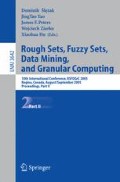Abstract
Finding orthologous genes, similar genes in different genomes, is a fundamental problem in comparative genomics. We present a model for automatically extracting candidate ortholog clusters in a large set of genomes using a new clustering method for multipartite graphs. The groups of orthologous genes are found by focusing on the gene similarities across genomes rather than similarities between genes within a genome. The clustering problem is formulated as a series of combinatorial optimization problems whose solutions are interpreted as ortholog clusters. The objective function in optimization problem is a quasi-concave set function which can be maximized efficiently. The properties of these functions and the algorithm to maximize these functions are presented. We applied our method to find ortholog clusters in data which supports the manually curated Cluster of Orthologous Genes (COG) from 43 genomes containing 108,090 sequences. Validation of candidate ortholog clusters was by comparison against the manually curated ortholog clusters in COG, and by verifying annotations in Pfam and SCOP – in most cases showing strong correlations with the known results. An analysis of Pfam and SCOP annotations, and COG membership for sequences in 7,701 clusters which include sequences from at least three organisms, shows that 7,474(97%) clusters contain sequences that are all consistent in at least one of the annotations or their COG membership.
Access this chapter
Tax calculation will be finalised at checkout
Purchases are for personal use only
Preview
Unable to display preview. Download preview PDF.
References
Fitch, W.M.: Distinguishing homologous from analogous proteins. Syst. Zool. 19, 99–113 (1970)
Fujibuchi, W., Ogata, H., Matsuda, H., Kanehisa, M.: Automatic detection of conserved gene clusters in multiple genomes by graph comparison and P-quasi grouping. Nucleic. Acids Res. 28, 4096 (2002)
Tatusov, R., Koonin, E., Lipmann, D.: A genomic perspective on protein families. Science 278, 631–637 (1997)
Strom, C.E., Sonnhammer, E.L.: Automated ortholog inference from phylogenetic trees and calculation of orthology reliability. Bioinformatics 18, 92–99 (2002)
Remm, M., Strom, C.E., Sonnhammer, E.L.: Automatics clustering of orthologs and in-paralogs from pairwise species comparisons. J. Mol. Biol. 314, 1041–1052 (2001)
Zmasek, C.M., Eddy, S.R.: RIO: Analyzing proteomes by automated phylogenomics using resampled inference of orthologs. BioMed Central Bioinformatics 3 (2002)
Tatusov, R.L., Galperin, M.Y., Natale, D.A., Koonin, E.V.: The COG database: a tool for genome-scale analysis of protein function and evolution. Nucleic. Acids Res. 28, 33–36 (2000)
Bateman, A., Coin, L., Durbin, R., Finn, R.D., Hollich, V., Griffiths-Jones, S., Khanna, A., Marshall, M., Moxon, S., Sonnhammer, E.L.L., Studholme, D.J., Yeats, C., Eddy, S.R.: The Pfam protein families database. Nucleic. Acids Res. 32, 138–141 (2004)
Andreeva, A., Howorth, D., Brenner, S.E., Hubbard, T.J.P., Chothia, C., Murzin, A.G.: SCOP database in 2004: refinements integrate structure and sequence family data. Nucleic. Acids Res. 32, 226–229 (2004)
Mirkin, B., Muchnik, I.: Layered clusters of tightness set functions. Appl. Math. Lett. 15, 147–151 (2002)
Altschul, S., Madden, T., Schaffer, A., Zhang, J., Zhang, Z., Miller, W., Lipman, D.: Gapped BLAST and PSI-BLAST: a new generation of protein database search programs. Nucleic. Acids Res. 25, 3389–3402 (1997)
Eddy, S.R.: A review of the profile HMM literature from 1996-1998. Bioinformatics 14, 755–763 (1998)
Rand, W.M.: Objective criterion for the evaluation of clustering methods. J. Am. stat. Assoc. 66, 846–850 (1971)
Hubert, L.J., Arabie, P.: Comparing partitions. Journal of Classification 2, 193–218 (1985)
Tomii, K., Kanehisa, M.: A comparative analysis of ABC transporters in complete microbial genomes. Genome Res. 8, 1048–1059 (1998)
Author information
Authors and Affiliations
Editor information
Editors and Affiliations
Rights and permissions
Copyright information
© 2005 Springer-Verlag Berlin Heidelberg
About this paper
Cite this paper
Vashist, A., Kulikowski, C., Muchnik, I. (2005). Screening for Ortholog Clusters Using Multipartite Graph Clustering by Quasi-Concave Set Function Optimization. In: Ślęzak, D., Yao, J., Peters, J.F., Ziarko, W., Hu, X. (eds) Rough Sets, Fuzzy Sets, Data Mining, and Granular Computing. RSFDGrC 2005. Lecture Notes in Computer Science(), vol 3642. Springer, Berlin, Heidelberg. https://doi.org/10.1007/11548706_43
Download citation
DOI: https://doi.org/10.1007/11548706_43
Publisher Name: Springer, Berlin, Heidelberg
Print ISBN: 978-3-540-28660-8
Online ISBN: 978-3-540-31824-8
eBook Packages: Computer ScienceComputer Science (R0)

